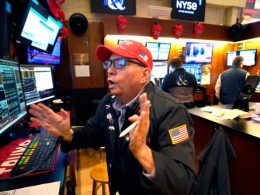Unlock the Editor’s Digest for free
Roula Khalaf, Editor of the FT, selects her favourite stories in this weekly newsletter.
The writer is co-founder and chief investment strategist at Absolute Strategy Research
‘It’s prices stupid’ was the key lesson that policymakers and markets should take from the US election, as voters appeared to judge the economy through the prism of high prices, rather than falling inflation, or low unemployment. It may be time for them to revisit their policy mandates.
Economic concerns remained central to the US election for 80 per cent of Republican voters, second only to immigration. This was despite low unemployment, inflation heading towards 2 per cent, and expectations of lower interest rates. The main issue was that the pandemic price shock was not transitory. Despite inflation moderating, as post-pandemic supply pressures eased, a common theme was how voters were being squeezed by elevated price levels, with real wages failing to keep pace. Incumbent administrations in the UK and France were also ushered from office due, in part, to similar economic concerns about prices.
In the US, the prices of goods that households regularly purchase (food and petrol) were 28 per cent above January 2020 levels (18 per cent above where they should have been in a 2 per cent inflation world). In the UK, food, drink and energy prices are 30 per cent higher, while in the Eurozone, the European Central Bank’s ‘Frequent Out Of Pocket Purchases’ index is up 26 per cent since the pandemic. It’s no wonder people are hurting.
There are several lessons policymakers might take away from these political outcomes. For a start, headline inflation matters to people more than “core” — current policy may be targeting the wrong variable. Central banks may feel they are better able to influence “core” prices with their policy, but by looking through shocks in food and energy prices, they are ignoring the prices that matter for most people. If policy had sought to bring demand and supply into equilibrium earlier, we might have seen lower peak inflation, less price persistence, and less political turmoil.
But a more fundamental change may be required. Many big central banks have implicitly returned to setting monetary policy with reference to Taylor Rule models, where interest rates are anchored around how far the economy is from the inflation target, and the degree of slack in the economy. However, these elections suggest that voters would prefer more price-level stability, over low inflation rates, or full employment.
If that’s the case, then central banks might want to revisit an alternative policy framework; the idea of price-level targeting, as proposed by Professor Michael Woodford of Columbia University. In this framework, policy targets a constant rise in the level of prices over time, so that if prices rise above that rate, policy has to respond sufficiently to reverse any price level divergence. This contrasts with the current framework, which can celebrate a return to 2 per cent inflation, even though the target has been missed for multiple years, and has left households with major losses in real purchasing power. By encouraging early action to limit the initial divergence from the desired price levels, this framework can, theoretically, deliver gains for consumers.
Another issue with the current inflation targeting regime is that for economies with large services sectors, the centrality of labour costs to service-sector inflation means that squeezing real labour incomes has been a key part of achieving the inflation targets. Indeed, ever since Paul Volcker as Federal Reserve chair started bearing down on inflation from the end of the 1970s, the majority of the gains in productivity have been captured by companies, not labour. Inflation targeting was supposed to boost productivity through reducing uncertainty and encouraging investment. But trend productivity has actually slowed since the early 1980s. Companies boosted profits, not growth, by cutting investment, increasing dividends, and prioritising buybacks.
Because inflation targeting has boosted returns to capital over labour, it may have also contributed to increasing income inequality. This disparity has probably played a role in the rise in populism in many countries.
In conclusion, this year’s elections have been an implicit rejection of the current monetary framework. Despite low unemployment, elevated price levels have squeezed real wages for many, fuelling discontent. If politicians want to get re-elected, and central banks want to remain relevant to society, it may well be time for them to revisit their mandates.
Source link










